Americano Blu-ray Movie
HomeAmericano Blu-ray Movie 
MPI Media Group | 2011 | 106 min | Not rated | Oct 30, 2012
Movie rating
6.2 | / 10 |
Blu-ray rating
| Users | 3.0 | |
| Reviewer | 4.0 | |
| Overall | 3.8 |
Overview
Americano (2011)
After a childhood in Los Angeles. Martin returned to Paris to join his father following his parents' separation. Now, Martin must revisit the past as he winds up his mother's affairs after her death. Overcome by grief, Martin leaves L.A. for Tijuana on the trail of Lola, a Mexican woman he knew as a child, and who held a special place in his mother's heart.
Starring: Mathieu Demy, Salma Hayek, Geraldine Chaplin, Chiara Mastroianni, Carlos BardemDirector: Mathieu Demy
| Drama | Uncertain |
| Foreign | Uncertain |
Specifications
Video
Video codec: MPEG-4 AVC
Video resolution: 1080p
Aspect ratio: 2.35:1
Original aspect ratio: 2.39:1
Audio
French: DTS-HD Master Audio 5.1
Subtitles
English, English SDH, Spanish
Discs
25GB Blu-ray Disc
Single disc (1 BD)
Playback
Region A (locked)
Review
Rating summary
| Movie | 4.5 | |
| Video | 4.0 | |
| Audio | 4.0 | |
| Extras | 2.0 | |
| Overall | 4.0 |
Americano Blu-ray Movie Review
The Scrapbooks We Carry Inside Us
Reviewed by Michael Reuben October 28, 2012In a signature line from David Lynch's twisted coming-of-age film, Blue Velvet, the young hero is told, "I can't figure out if you're a detective or a pervert." The same could be said for Martin, the protagonist of director, writer and star Mathieu Demy's Americano, a deceptively simple tale about a forty-ish man who makes unexpected discoveries while dealing with the death of his mother. Because Demy is the son of two fabled French directors, Jacques Demy (The Umbrellas of Cherbourg) and Agnès Varda (One Sings, The Other Doesn't), too many reviewers have viewed Americano solely through the prisms of his parents' works. Having been raised in a family steeped in cinema, Demy has obviously made a film bearing the stamp of that heritage; how could it not? Demy even incorporates clips from his mother's 1981 film Documenteur, where he appeared at age nine playing a boy named "Martin", whose childhood is similar to the memories of Martin in Americano. (Steven Soderbergh used a similar device in 1991's The Limey, where clips from a 32-year-old film starring Terence Stamp represented the memories of Stamp's current character, now much older.) But children are never mere carbon copies of their parents, and Americano is far more than a hybrid of the styles of Demy's parents. Demy's life and cinematic experience range far beyond his parents' films. Among other things, he has absorbed the casual genre-hopping and plotbending that have become almost second nature to confident filmmakers in the last 30 years. The result is a film that repeatedly and unexpectedly changes direction, although Demy, like all good storytellers, never loses sight of where he started and eventually gets back there. Even when he's doing something that invokes the family tradition, Demy does it his way. As he says in the intriguing interview included on the disc, Demy asked Catherine Deneuve's daughter, Chiara Mastroianni, to play his love interest in Americano not only because Deneuve was his father's favorite actress, but also because he and Mastroianni have known each other for a long time and he admires her as an actress—she's his generation.
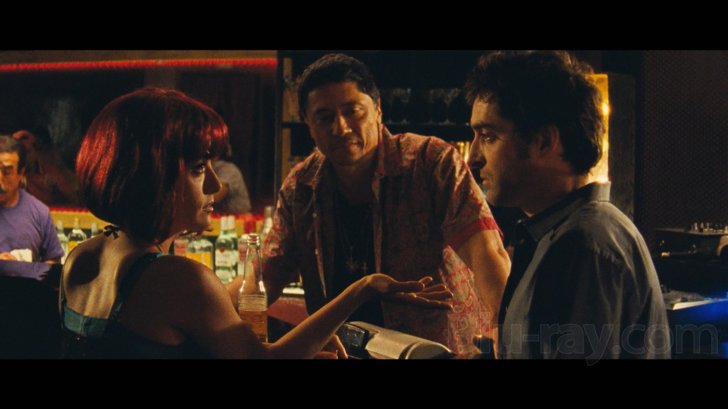
Americano opens with Martin (Demy) and Claire (Mastroianni) having sex. It's an awkward scene filled with mixed signals: a paradigm of Martin's whole life. Later, Martin receives a phone call informing him that his mother has died, and he collapses. As Martin visits with his gruff father (Jean-Pierre Mocky) to discuss arrangements, the broad outlines of the family history emerge. As a child, Martin lived with his mother in Los Angeles after his parents separated. Later, she remained behind, while Martin returned to France to live with his father. The marriage was never happy (she didn't talk to me, even when we lived together, the father complains), and Martin's father was less than enthusiastic as a parent. When Martin mentions that Claire wants to have a baby, his father advises against it, because "kids are a pain in the ass". He does find his son useful at the moment, however, because Martin is a real estate agent, and someone has to go to America and sell his late mother's apartment. As it happens, Martin also has a U.S. passport (which confirms that he was born on American soil). Martin flies to L.A. as if to his own funeral. He's greeted by his mother's long-time and emotional friend, Linda (Geraldine Chaplin, almost bursting out of the frame with the same manic energy she displayed in Nashville more than 35 years earlier). As Martin cleans out the apartment and wanders through the complex he vaguely recalls, he's haunted by fragmented memories of the enigmatic woman he knew as a child. (The scenes are from Documenteur and feature the late Sabine Mamou with the young Demy.) At the window of a neighboring apartment, Martin spots an old man he remembers from many years ago, who was always writing, then on a typewriter, now on a Powerbook (in the archive footage, the writer was Gary Feldman; in the new footage, he is Nick Roberts). The writer tells Martin about a Mexican girl named Lola, with whom he used to play. Lola, says the writer, became very special to your mother after you left. When Martin asks Linda about this girl, the elderly lady instantly becomes angry and defensive. Before long, Martin finds himself on Lola's trail, with an address from his mother's papers and a photograph from the writer. The trail leads to a strip joint named "Americano" at the end of a dark alley in Tijuana, where Lola (Salma Hayek) turns out to be a stripper in a red wig with a jagged scar on her right cheek. She'll talk to Martin, but only if he pays her—and she doesn't want to remember the past. By this point, the film has taken a hard left into pulp and film noir, complete with femme fatale, contested property (it turns out the deceased mother may have left her apartment to Lola and not Martin), an investigation with mixed motives, a secret locker and a shady character with menace in his smile (Carlos Bardem, older brother of Javier). The simple Parisian bourgeois, Martin, is as unprepared for this world as the viewer of Americano, and I found the transition bracing precisely because it's done so casually, as if it were the most natural thing in the world. (Some viewers, though, may find it strange and offputting.) Fans of French cinema will recognize "Lola" as the name of Jacques Demy's 1960 film about a cabaret singer whom the protagonist knew as a teenager. But the elder Demy's Lola was a very different kind of film; Demy Sr. described it as "a musical without music", whereas Americano often feels, in its latter half, like an emotional disaster film—in slow motion—as Martin plunges thoughtlessly into one dangerous situation after another, seeking . . . what exactly? In the accompanying interview, Demy speaks of the grieving process and how it is specific to each individual and entirely unpredictable. Americano sketches a portrait of one person, then slyly draws you in while that person's world is shattered, rearranged and (maybe) opened up by grief. The film's ending will divide viewers. Some may feel cheated or let down, while others (myself included) will want to return to the beginning and take a fresh look at Martin.
Americano Blu-ray Movie, Video Quality 
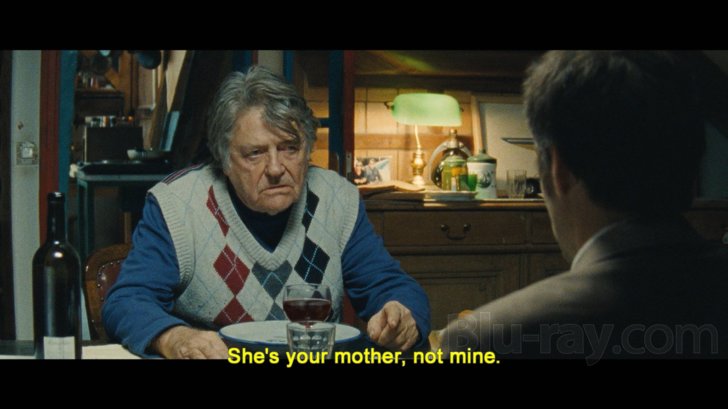
Grainophobes, beware! I am giving MPI Media's 1080p, AVC-encoded Blu-ray of Americano high marks for video, and any member of Blu-ray.com's discussion forum who wonders how that can possibly be, in light of the screenshots, obviously hasn't read this explanation. My primary criterion for a Blu-ray image is accuracy, and the Blu-ray of Americano accurately reproduces the film's image. That image comes from two sources:
- Contemporary Super16 photography—in other words, half the resolution of the more common Super35 format—cropped to 2.35:1 for widescreen display. Demy explains in the extras that he adopted this format so that he could establish a "dialogue" with the second source described below.
- Unrestored (deliberately unrestored) excerpts from Documenteur, the 1981 film by Agnès Varda in which Demy appeared as a child and which provides the material for Martin's memories of his mother. Documenteur was shot full-frame in Academy ratio on 35mm but in a grainy documentary style. The excerpts appear in Americano windowboxed in the center of the 2.35:1 frame.
Americano Blu-ray Movie, Audio Quality 
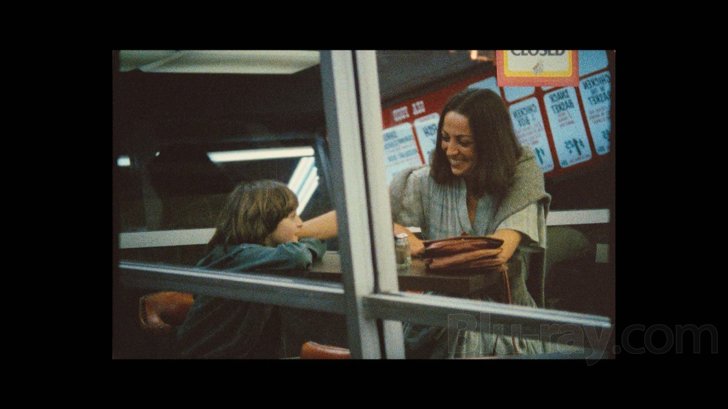
The Blu-ray's DTS-HD MA 5.1 track beautifully recreates Americano's distinctive and subtly engineered soundtrack. Demy may not have any action scenes to work with, but that doesn't stop him from using the full resources of modern motion picture sound technology to express Martin's inner state. The film's sound routinely shifts between real and unreal, often without warning and by subtle transition. When Martin first hears Lola sing, the sound goes wildly out of synch and eventually her lips stop moving altogether; as the camera moves toward Martin, it becomes obvious that what he's hearing (and possibly seeing) differs from what's happening on the stage. When Martin arrives at the Los Angeles morgue to sign a release for his mother's body, he is escorted down a long hall by a sepulchral mortician who seems to be ushering him to the grave. As Martin approaches his "destination", everything drops away but the sounds of fluorescent lights buzzing and Martin breathing, and these grow to dominate the track as an embalmed body appears out of focus in the background. Gradually, however, another sonic presence announces itself in the background of the track, and at first you're not quite sure what it is. As the balance shifts, you realize that it's musical, familiar and wholly out of character with the sober piano score by Grégoire Hetzel (Incendies) that has dominated the soundtrack until that point. It's a pop song I won't identify, because that would be something of a spoiler. The song signals a change in the film's direction, like a switch going off in Martin's head. A few scenes later, it has been reduced to source music on a radio. Americano has its share of typical environmental sound cues, especially in the Tijuana scenes and local hangouts, but the truly memorable sonic elements are all of an expressive quality such as those described above (including an elaborate sequence of crosscutting near the end). It's a first-rate track.
Americano Blu-ray Movie, Special Features and Extras 
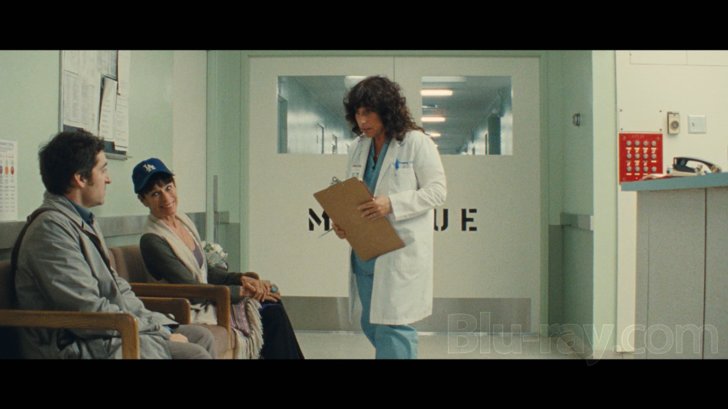
- Interview with Mathieu Demy (HD, 1080p; 1.78:1; 9:54): Interviewed in English, Demy provides an articulate and concentrated presentation of his background, intentions and methods.
- Trailer (HD, 1080p; 2.35:1; 2:03): In French and English. Even if the critics missed the film noir elements, the trailer editors did not. They used almost every noir-ish shot to build a mood for the trailer that isn't representative of the film as a whole.
- Additional Trailers: At startup the disc plays trailers for The Heineken Kidnapping (1080p), Fightville (1080p) and Little White Lies (1080p) . These can be skipped with the chapter forward button and are not otherwise available once the disc loads.
Americano Blu-ray Movie, Overall Score and Recommendation 
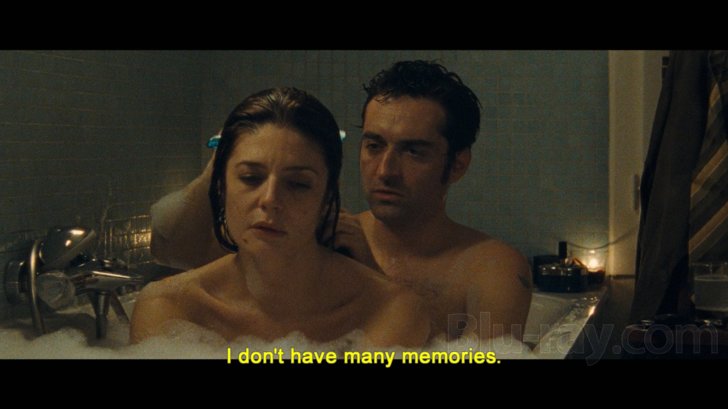
Americano is an impressive debut by a thoughtful filmmaker with a notable ability to use his artistic heritage without being overwhelmed by it. In academic circles, the term "anxiety of influence" has been used to describe a syndrome in which an artist's terror of repeating past works leads to paralysis. If Demy ever suffered from this condition, there is no evidence of it in Americano. An assured work that moves to its own rhythm, the film tells an intriguing story while playfully acknowledging (and reckoning with) the family business to date. After spending much of the film wishing to be somewhere else, Martin speaks volumes at the end when he says, simply, "I'm here." Clearly so is Demy. Highly recommended.
Similar titles
Similar titles you might also like

Vivre sa vie
Vivre sa vie: Film en douze tableaux / My Life to Live
1962

Sarah's Key
Elle s'appelait Sarah
2010

Code Unknown
Code inconnu: Récit incomplet de divers voyages
2000

Babette's Feast
Babettes gæstebud
1987

Touki Bouki
1973

Little White Lies
Les petits mouchoirs
2010

Transit
2018

Breathless
À bout de souffle
1960

Out 1
Out 1, noli me tangere
1971

La Haine
1995

Summer Hours
L'heure d'été
2008

The Fire Within
Le feu follet
1963

Soleil Ô
Oh, Sun
1967

The Big Picture
L'Homme qui voulait vivre sa vie
2010

Jules and Jim
Jules et Jim
1962

L' Atalante
1934

36th Precinct
36 quai des Orfèvres
2004

Panique
Panic
1946

The Class
Entre les murs
2008

Pickpocket
1959